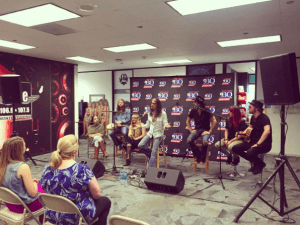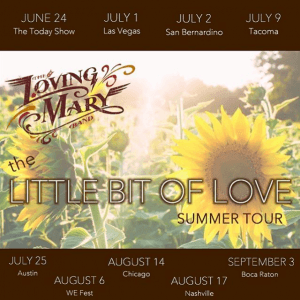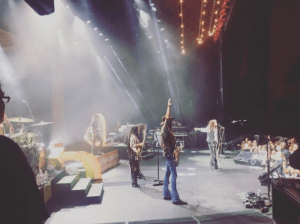Rarely do students get the chance to work everyday on the set of one of their favorite television shows. But this summer TAI Creative Advertising student Jackson Foley had that opportunity. Foley worked as a Production Intern at “The Late Show with Stephen Colbert.”
Like many other internships, Foley applied for this position online, through the CBS intern portal. Once he was chosen as a possible candidate for the job, he flew up to New York twice to interview.
“I learned in the process when applying for any job in creative production,” Foley said, “you will always be told when [and] if you got the job on the very last possible day they can tell you. In my case, that was the beginning of May, which gave me two weeks to find a place to live and move everything up there.”
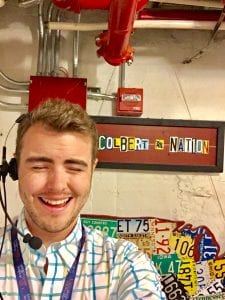
A typical day on the job, if there really was one, involved arriving at the studio at 9am to coordinate with productions managers on the schedule for the day and prepare all the necessary papers and memos for the morning product meeting. After the meeting, Foley would work as a talent assistant or help with a digital shoot for the cold-open until 2pm. Then he would coordinate the progress of the script and print a finalized version for the rehearsal, along with a shot list. He would then run the shot lists to each camera and production staff, and deliver scripts to Stephen Colbert and the executive producers. At 3pm, he would watch rehearsal and then work on production tasks until 4pm, when he would run scripts again—now with the live audience in the theater. Foley would watch the show to make sure nothing in the script was incorrect or troublesome, and then work on digital shoots until 9pm.
“I worked predominately with the production side of the show, so stage managers, production coordinators, show runners and producers,” Foley said. “[Essentially] if the writers are the brain of a TV show, the script manager/runner is the nervous system that delivers the messages to each person that works on the show. Each day I mainly worked as a script manager or digital production assistant.”
Aside from running the scripts every day, Foley had a few more personal interactions with Stephen Colbert throughout the internship.
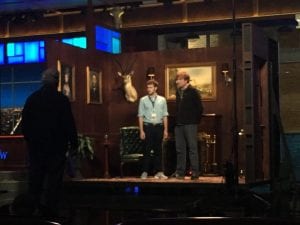
“I was a stand in for a sketch between Stephen and Bryan Cranston, where they acted like villains from a 1920s movie,” Foley said, “and got to speak with him briefly while the set was being finalized. At the end of the internship, he held a ‘seminar’ in a small room for around an hour where we could ask him anything we wanted to know, and he was honestly one of the smartest yet nicest people I’ve ever had the privilege to talk to.”
Foley’s favorite memories from his internship include special live shows “The Late Show” did during both political conventions this summer. Through this internship he realized something very important about his future career aspirations.
“Getting to see how each night came together was extremely satisfying,” Foley said. “From getting to see the writers bring in an actor look-alike for Melania Trump for the Republican Convention, to meeting and talking with John Stewart during the Democratic Convention. Working with ‘The Late [Show]’ really helped me discover my love for working at a place where each day is something entirely different from the day before, as well as how much I want to work in an industry that makes content people can laugh at and ultimately connect with.”
Foley attributes a lot of his internship success to skills he learned in his Advertising courses.
“Understanding how media buying and partnerships work was an incredibly helpful skill for helping set up a partnership between the show and Giphy,” Foley said. “Also, knowing how to layout information in an easy-to-understand [and] aesthetically pleasing way helped me get noticed while making posters/documents internally for the show, which led to a couple of conversations that got me more important [and] interesting jobs.”
Foley also learned some incredibly important lessons that serve as good advice to anyone working in a new position.

“In all honesty, what I learned the most from the internship is to always be up for ‘boring’ or ‘uninteresting’ jobs,” Foley said. “I was one of fourteen interns, half of which went to Ivy League schools, the other half being those with actual production experience, and the best way I became noticed was by doing the tasks that most didn’t clamor to have. Through that, I was given more and more jobs with increased importance, like costume runs or script deliveries, and eventually served as an interim writer’s assistant during the Live Shows. To make it short: Want to be noticed in a pool of talented [and] interesting people? Be proactive, even when you don’t have to be.”


